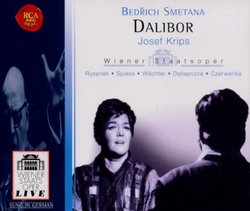| All Artists: Smetana, Wachter, Spiess, Krips, Vopc Title: Dalibor Members Wishing: 0 Total Copies: 0 Label: RCA Original Release Date: 1/1/1969 Re-Release Date: 11/24/1998 Genre: Classical Style: Opera & Classical Vocal Number of Discs: 2 SwapaCD Credits: 2 UPC: 743215773528 |
Search - Smetana, Wachter, Spiess :: Dalibor
 | Smetana, Wachter, Spiess Dalibor Genre: Classical
Smetana's Dalibor is his tragic masterpiece, a typically Romantic tale of chivalry, betrayal, and the power of music to calm the soul. This performance, taken from the archives of Austrian Radio, features the legendary Leo... more » |
Larger Image |
CD Details
Synopsis
Amazon.com
Smetana's Dalibor is his tragic masterpiece, a typically Romantic tale of chivalry, betrayal, and the power of music to calm the soul. This performance, taken from the archives of Austrian Radio, features the legendary Leonie Rysanek (as well as her sister Lotte, who sounds rather like her), along with an exciting heroic tenor, Ludovico Speiss, in the title role, all under the baton of Josef Krips. It's a compelling example of the type of "ensemble" casting typical of Vienna in the 1950s and '60s, before star singers took over the world's operatic stages to the great detriment of dramatic coherence and breadth of repertoire. It was Mahler who first brought this opera to Vienna, and for all we know, this may be his version of the work--German language, cuts, and all. Anyone seriously interested in Smetana's operas will, of course, want one of the Czech versions on Supraphon, both of which offer the work complete in superb performances. But this is much more than a curiosity--an exciting, indeed visceral performance in its own right, and one which opera lovers (to say nothing of Rysanek fans) will snap up as a matter of course. --David Hurwitz

 Track Listings (15) - Disc #1
Track Listings (15) - Disc #1